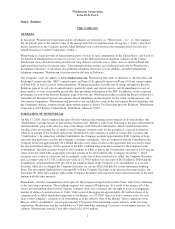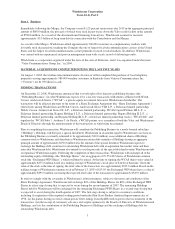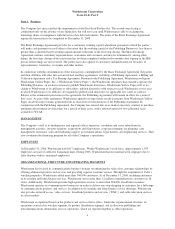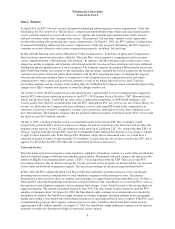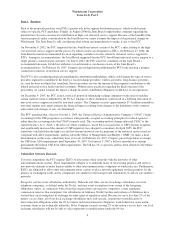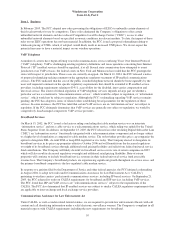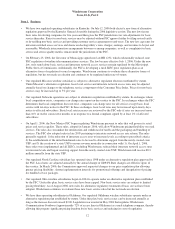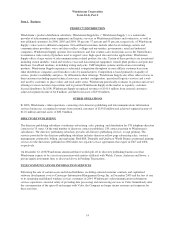Windstream 2006 Annual Report Download - page 76
Download and view the complete annual report
Please find page 76 of the 2006 Windstream annual report below. You can navigate through the pages in the report by either clicking on the pages listed below, or by using the keyword search tool below to find specific information within the annual report.
Windstream Corporation
Form 10-K, Part I
Item 1. Business
• We have two regulated operating subsidiaries in Kentucky. On July 12, 2006 both elected a new form of alternative
regulation approved by the Kentucky General Assembly during the 2006 legislative session. The new law freezes
basic rates for electing companies for five years and then gives the PSC jurisdiction over rate adjustments for basic
service thereafter. Rates for non-basic services may be adjusted without PSC approval either by filing revised tariffs
or de-tariffing non-basic services and providing customer service agreements to end-users. The new law caps rates for
intrastate switched access services and deems an electing utility’s rates, charges, earnings, and revenues to be just and
reasonable. Wholesale interconnection arrangements between or among companies, as well as complaints for basic
service and service quality metrics remain under the jurisdiction of the PSC.
• On February 23, 2006, the Governor of Mississippi signed into law HB 1252, which substantially reduced state
PSC regulation of wireline telecommunications services. The law became effective July 1, 2006. Under the new
law, only stand-alone basic service and intrastate network access services remain regulated by the Mississippi
Public Service Commission. Additionally, the PSC is developing a rural ILEC price regulation plan as an
alternative form of regulation for rural companies. Windstream continues to evaluate these alternative forms of
regulation, but has not made an election and continues to be regulated under rate-of-return.
• Our regulated Missouri wireline subsidiary is subject to alternative regulation election established by statute.
Under Missouri’s alternative regulation, basic local service and intrastate network access rates may be adjusted
annually based on changes to the telephone service component of the Consumer Price Index. Prices for non-basic
services may be increased up to 5% per year.
• Our regulated Nebraska operations are subject to alternative regulation established by statute. In exchanges where
local competition exists, companies can change rates upon ten days notice to the PSC. In exchanges where the PSC
determines that local competition does not exist, companies can change rates for all services except basic local
service with ten days notice to the PSC. In these exchanges, basic local rates may be increased upon ninety days
notice to affected subscribers. Basic local rate increases are reviewed by the PSC only if rates are increased more
than 10% in twelve consecutive months or in response to a formal complaint signed by at least 2% of affected
subscribers.
• On April 1, 2006, the New Mexico PSC began regulating Windstream pursuant to rules that will govern its retail
prices and service quality. These rules, adopted in January 2006, will allow Windstream pricing flexibility on retail
services. The rules also streamline the introduction and withdrawal of tariffs and the packaging and bundling of
services. The PSC also adopted rules in late 2005 pertaining to intrastate network access rate reform. The rules
generally required: 1) the reduction of intrastate access rates to interstate levels according to prescribed criteria;
2) the establishment of the initial benchmark rates to be used to determine support from the newly created state
USF; and 3) the creation of a state USF to ensure revenue neutrality in connection with (1). On April 1, 2006,
these rules were implemented and all ILECs, including Windstream, reduced their intrastate network access rates
to interstate levels and began receiving support from the newly created state USF. Windstream will receive $8.3
million annually from the state USF.
• Our regulated North Carolina subsidiary has operated since 1998 under an alternative regulation plan approved by
the PSC. Local rates are adjusted annually by the annual change in GDP-PI. Rate changes are effective upon 14
days notice. In March 2006, the Commission approved requested changes to our price regulation plan allowing
greater pricing flexibility, shorter implementation intervals for promotional offerings and deregulation of pricing
for bundled service packages.
• Our regulated Ohio wireline subsidiaries began in 2004 to operate under an alternative regulation plan established
by the PSC. Under this plan, basic service rates have been capped. Non-basic service rates are subject to limited
pricing flexibility. As of August 2006, new rules for alternative regulatory treatment of basic service have been
adopted. Windstream continues to evaluate these new basic service rules but has not made an election.
• We have three operating subsidiaries in Oklahoma. Our regulated Oklahoma wireline subsidiaries operate under an
alternative regulation plan established by statute. Under this plan, basic service rates can be increased annually as
long as the increase does not exceed $2.00. Legislation was enacted in May 2004 that regulates Windstream
Communications Southwest (approximately 72% of access lines in Oklahoma) as a rural telephone company, thereby
allowing this property significant pricing freedom for its basic services and reducing its costs of regulation.
12


